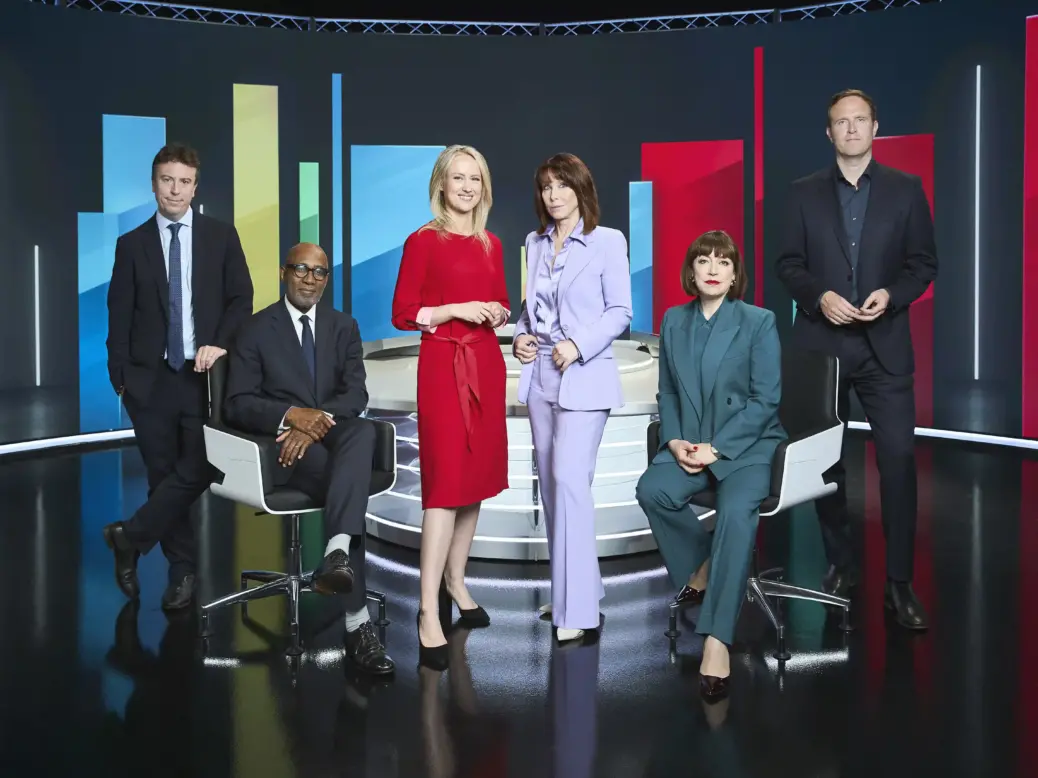
As the dust settles on the election, newsrooms across the country will now be dissecting the outcome and analysing the impact of the results. This is the seventh election I have covered, and it has been a campaign with lessons for political journalism.
While journalism indeed faces challenges on many fronts, the role that news organisations continue to play in scrutinising political parties at the key moment of democratic decision remains both essential and in demand.
The figures speak for themselves. The Battle for Number 10 [leader special] programme saw Sky News receive some of its best ever TV audiences, reaching 2.45 million people over its 90 minutes. And for election night itself, 2.5 million viewers tuned into Sky News and Sky Showcase between 9pm and 2am with many millions consuming our results service and analysis on our digital products.
This moment offers us an opportunity to take stock of some key moments from this election and what they mean for the journalism. So here are six reflections that stand out for me:
Six lessons from 2024 election at Sky News
1. Debates matter, but format is key – audiences want to hear more than 45s answers
Looking at our own output, the Sky News Battle for Number 10 leaders format proved resilient and informative for audiences in this campaign. We set about creating a special event in Grimsby that delivered room for scrutiny, avoiding the traps experienced by other broadcasters of shouty exchanges and a wave of soundbites.
Our viewing numbers told the story of our success. The Grimsby event beat our 2015 and 2017 leaders debate viewing figures and provided our highest peak audience figures for the year.
2. Politics isn’t just a Westminster story
At Sky News we decided it was imperative to hit the road with our broadcasting. Seeing the election through the eyes of our target towns series gave an edge to our reporting.
The issues and opinions that we covered from Great Grimsby and Cleethorpes showed that there was no better place to explain the dynamics of this election than this symbolic must win seat. Similarly, through our Faultlines and Bench Across Britain series we reported on the many concerns of ordinary people that simply weren’t being talked about by the politicians.
These pieces drew strong audiences on our digital platforms. So, covering political stories affecting the whole UK is an absolute must for future campaigns.
3. Campaigns still matter
Another key lesson from this election is that campaigns still matter. Despite a lack of jeopardy in the polling numbers ahead of 4 July, voters were still given some memorable and important moments in the campaign which undoubtedly shaped voting intent.
Our own social channels saw more engagement during this election than any other campaign in history and in today’s world social media is a good litmus test of how much people are engaging with an issue.
4. Data is the new frontier
In this election, the political parties have utilised data more than ever. Much of the media decided to do the same. From our regular campaign checks and online focus groups to the in-depth polling and analysis of the online election, we were able to identify the trends that matter and learn which claims from politicians that people just didn’t believe.
Audiences increasingly expect data-driven journalism, especially online, and in this election we saw broadcasters doubling efforts to meet this challenge – if done correctly that’s an asset to election coverage.
5. On-screen experts help audiences connect with politics
On-screen talent continue to help broadcasters to hold a true and meaningful connection with our audience. We’ve seen many news organisations securing big names for their offering.
Sky News was well set from the beginning of the campaign to bring viewers exciting reporting and expert analysis. Our refresh of our political programming was already well-established last autumn, and we extended these formats across a seven-day week during this campaign to meet audience appetite.
6. This was the podcast general election
Finally, this was truly the first podcast election. We’ve seen many media organisations double down on their audio output. Our own Electoral Dysfunction and Politics at Jack and Sam’s podcasts have each almost received two million downloads in recent months. I believe that political podcasts are only going to increase in their influence, so watch this space for what comes next time around.
Let’s not forget we have another seismic election around the corner, later in the year in the US. I do think many of the above lessons can be taken on board for November, after we all get a moment to catch our breath.
Email pged@pressgazette.co.uk to point out mistakes, provide story tips or send in a letter for publication on our "Letters Page" blog
